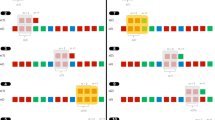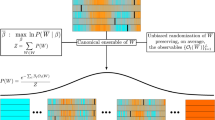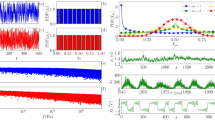Abstract
THERE are natural phenomena which, without being purely periodical in character, show cyclic variations with maxima of different height, minima of different depth and varying intervals between consecutive maxima or minima. While in many cases the cyclic variations are so strongly marked that there can be no doubt as to their reality, in other cases it might be difficult to decide whether the variations appearing in a series of observed quantities are of real significance or not. In the latter cases it would be advantageous if we could find a ‘reality index’ which would indicate the degree of reality of suspected cyclic variations in a similar manner as, for example, in the calculus of correlation the correlation coefficient expresses the degree of relationship between two sets of observed quantities.
This is a preview of subscription content, access via your institution
Access options
Subscribe to this journal
Receive 51 print issues and online access
$199.00 per year
only $3.90 per issue
Buy this article
- Purchase on Springer Link
- Instant access to full article PDF
Prices may be subject to local taxes which are calculated during checkout
Similar content being viewed by others
References
Nature, 157, 663 (1946).
Proc. Roy. Soc. Edin., 57, 228 (1936).
Author information
Authors and Affiliations
Rights and permissions
About this article
Cite this article
GLEISSBERG, W. Choice of a ‘Reality Index’ for Suspected Cyclic Variations. Nature 158, 915–916 (1946). https://doi.org/10.1038/158915b0
Issue Date:
DOI: https://doi.org/10.1038/158915b0
Comments
By submitting a comment you agree to abide by our Terms and Community Guidelines. If you find something abusive or that does not comply with our terms or guidelines please flag it as inappropriate.



